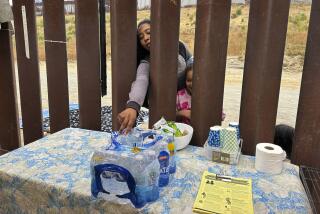Frenzy about Syrian refugees echoes the unfounded fears of past eras

- Share via
The Second World War is rightly remembered as a heroic time when Americans led the world to victory over German and Italian fascism and Japanese imperialism. But the glory of that era is marred by two enormous moral failings.
The first was the internment of thousands of Japanese Americans who lost their liberty, their property and their livelihoods because of the overblown fear that spies and saboteurs loyal to Tokyo might be hiding among them. The second was the failure of the U.S. government to provide a haven for many thousands of European Jews who would eventually be exterminated by the Nazis — a failure that can be attributed to the anti-Semitism that pervaded the State Department and extended to the White House.
Anyone who wonders how such betrayals of American values could have happened back then need only observe the current alarmist frenzy that has driven 31 governors to announce that they will refuse to allow Syrian refugees to enter their states and the House of Representatives to pass a bill that that would put a hold on the Obama administration’s plan to bring in as many as 10,000 people — mostly children and family groups — who have fled the Syrian civil war. Conservatives are pushing for additional legislation that would completely block immigration from countries where Islamic terrorists are active (would that include Belgium and France?) and some, including GOP presidential candidate Ted Cruz, the junior senator from Texas, are demanding that only Christian refugees be offered a haven.
Given the threat of attacks from Islamic State fanatics, security concerns are real, but fear can also provide an impetus and an excuse for people to act upon preexisting prejudices. Just as the interment of Japanese Americans was the ultimate expression of anti-Asian policies that had been common for a century, and just as rejection of Jewish refugees was the result of Christian America’s deeply embedded suspicion of Jews, the rush to lock out Syrian refugees may have as much to do with broad distrust and dislike of Muslims as it has with concerns about protecting “the homeland.”
Many Americans have a hard time distinguishing between the desperate families who have fled from Syria and jihadi thugs who have ripped that country apart. There is more at work here than the worry that terrorists will be able to sneak into the U.S. by blending in with the refugees. There is a deeper belief that all Muslims are utterly alien and incapable of adapting to America’s pluralistic, emancipated way of life.
People once had a similar distrust of Irish Catholics and Italians. Chinese and Japanese were once barred from entering the country and, when allowed in, barred from owning property in some places. Now, of course, it seems as if everyone claims Irish ancestry, pizza is as American as apple pie, a majority of Supreme Court justices are Catholic and Asians are, to their chagrin, stereotyped as the “model minority.” Are Muslims so different?
There are several million Muslims residing in the United States right now, and only a handful have been caught running off to join ISIS. Of the refugees who have been resettled here since Sept. 11, 2001, exactly zero have been charged with acts of terrorism, according to the Economist. That suggests the vetting process for refugees that is currently in place may be doing a good job. It may also mean that, unlike Belgium — a small country with a frighteningly high proportion of terrorists coming out of their marginalized Islamic immigrant population — the U.S. has been far more welcoming. We should be proud of that and not suddenly run off shrieking in the wrong direction.
If congressional leaders really want to improve safety and increase the effectiveness of our response to Islamist extremism, they ought to recognize that America’s productive, peaceful Muslim communities can provide some of the most effective allies in that battle. They should also be reminded that, while the latest immigrants have always been feared by some people in every era of American history, those fears have always proved inconsequential with the passage of time.
I would bet there were a few people back in the 1950s who did not think a Syrian refugee named Abdul Fattah Jandali should be let into the country, but it worked out pretty well for America.
You may have heard of Jandali’s son: Steve Jobs.
More to Read
A cure for the common opinion
Get thought-provoking perspectives with our weekly newsletter.
You may occasionally receive promotional content from the Los Angeles Times.











